UK Employment Law: A Study of Religious Discrimination and Inequality
VerifiedAdded on 2023/06/13
|20
|5820
|50
Essay
AI Summary
This essay provides an in-depth analysis of religious discrimination and gender inequality within the context of UK employment law. It begins by defining religious discrimination and its various forms, including direct, indirect discrimination, harassment, and victimization, highlighting the disproportionate impact on women. The essay then presents statistical data illustrating gender inequality in the UK, noting the country's ranking on the global gender gap index and the underrepresentation of women in top corporate positions. It examines the causes of religious discrimination, such as political, economic, and belief-related factors, and discusses situations where differential treatment based on religion may be lawful. The essay also references cases related to religious discrimination in the UK. The study concludes by offering recommendations for organizations to mitigate discrimination and promote equality in the workplace.
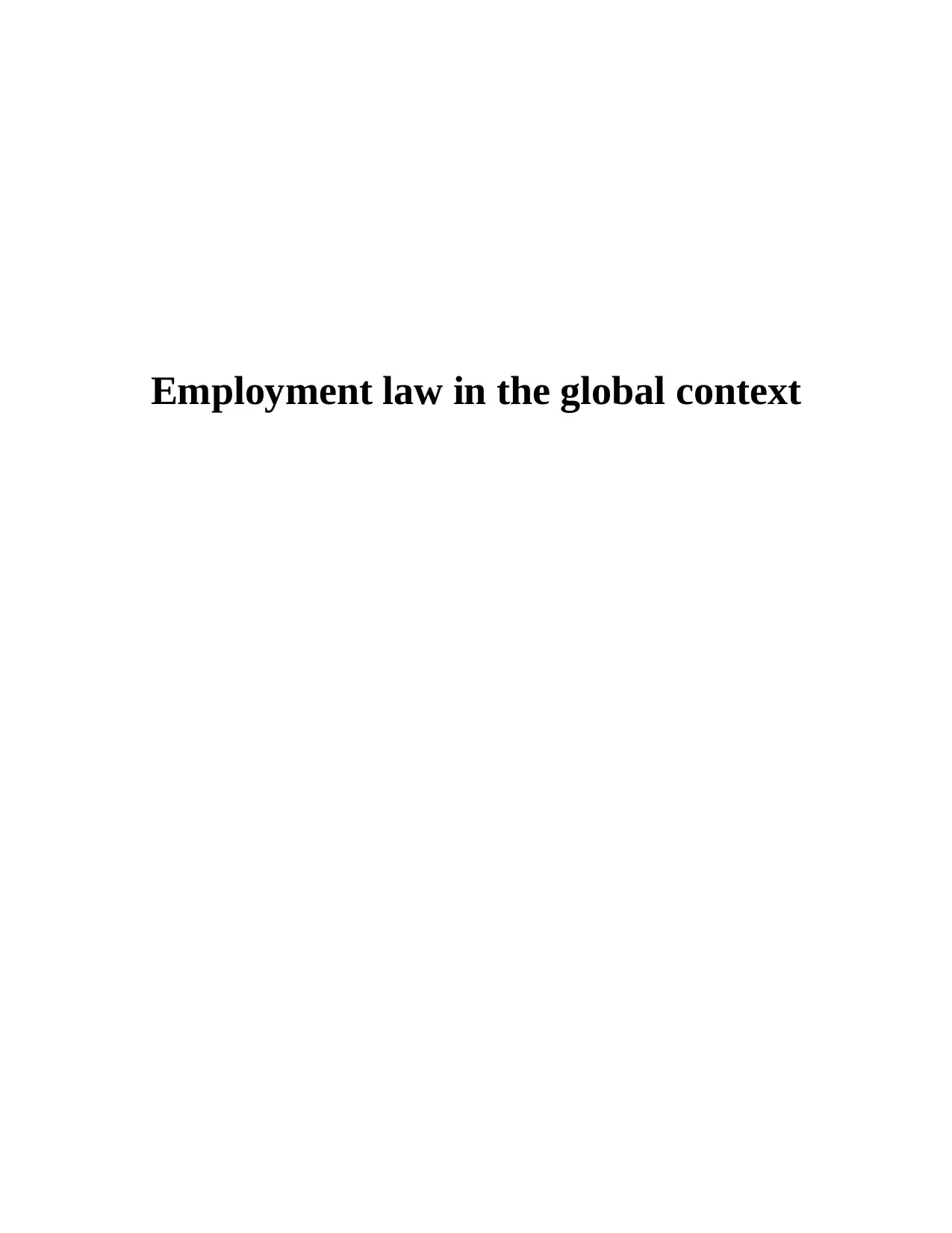
Employment law in the global context
Paraphrase This Document
Need a fresh take? Get an instant paraphrase of this document with our AI Paraphraser
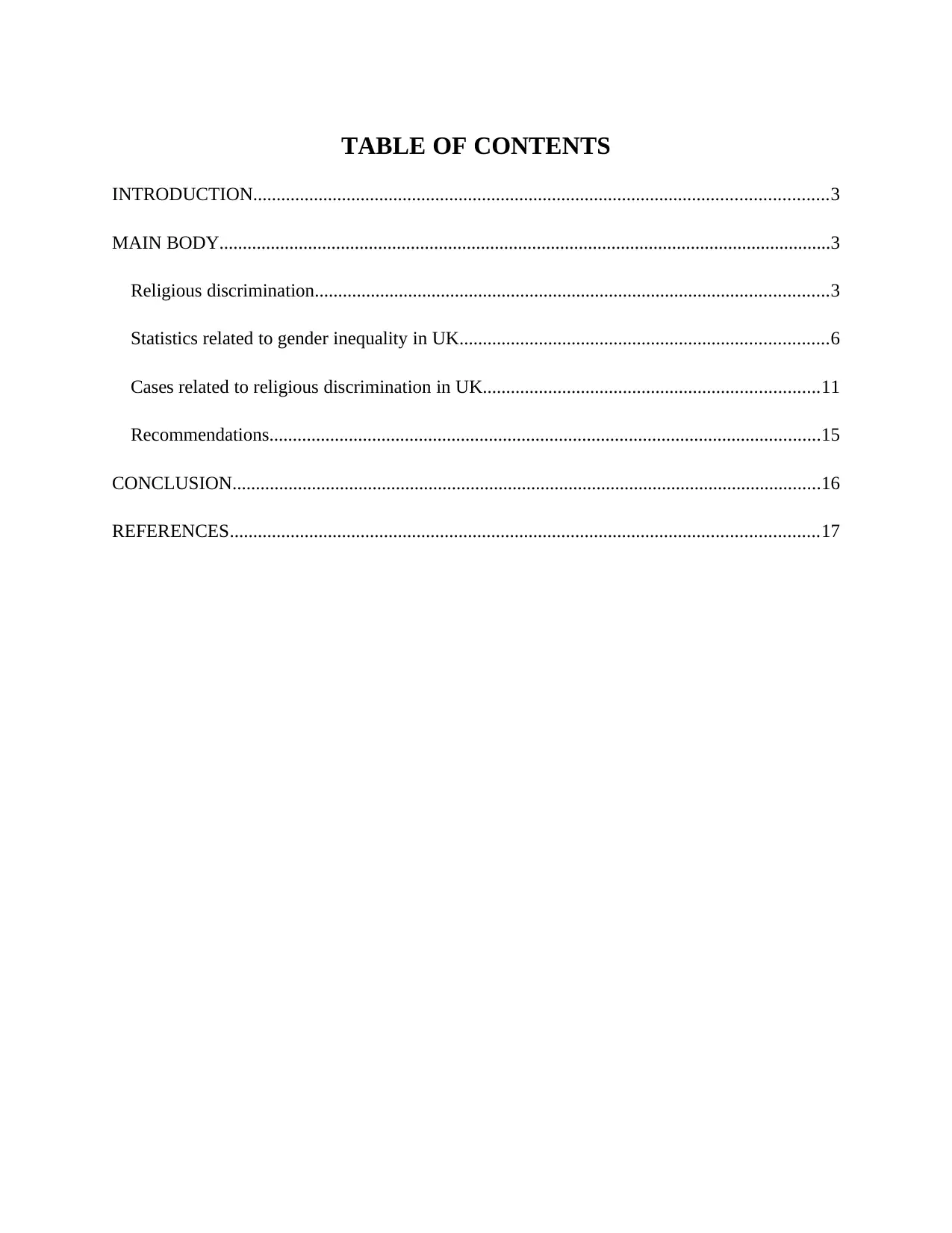
TABLE OF CONTENTS
INTRODUCTION...........................................................................................................................3
MAIN BODY...................................................................................................................................3
Religious discrimination..............................................................................................................3
Statistics related to gender inequality in UK...............................................................................6
Cases related to religious discrimination in UK........................................................................11
Recommendations......................................................................................................................15
CONCLUSION..............................................................................................................................16
REFERENCES..............................................................................................................................17
INTRODUCTION...........................................................................................................................3
MAIN BODY...................................................................................................................................3
Religious discrimination..............................................................................................................3
Statistics related to gender inequality in UK...............................................................................6
Cases related to religious discrimination in UK........................................................................11
Recommendations......................................................................................................................15
CONCLUSION..............................................................................................................................16
REFERENCES..............................................................................................................................17
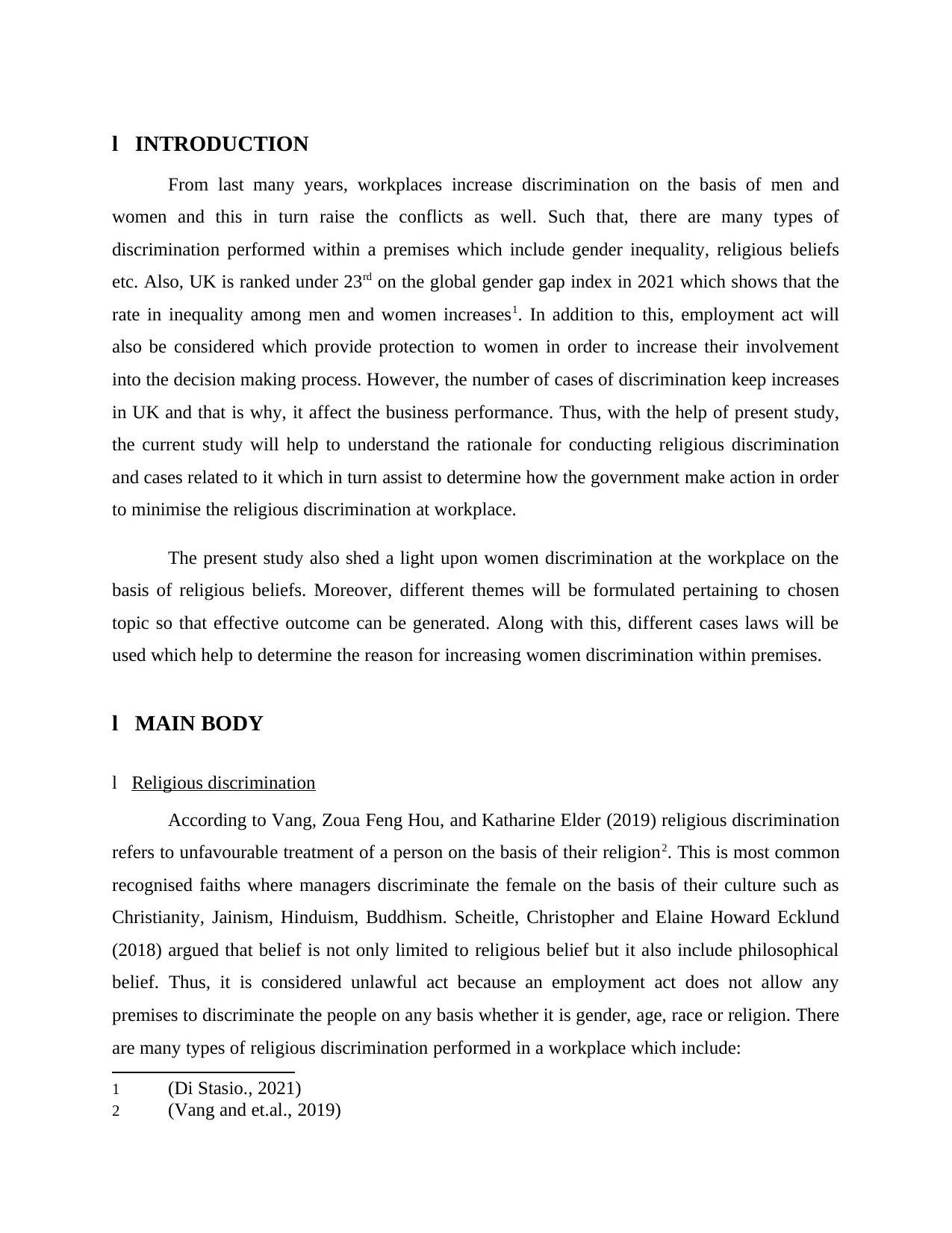
l壱INTRODUCTION
From last many years, workplaces increase discrimination on the basis of men and
women and this in turn raise the conflicts as well. Such that, there are many types of
discrimination performed within a premises which include gender inequality, religious beliefs
etc. Also, UK is ranked under 23rd on the global gender gap index in 2021 which shows that the
rate in inequality among men and women increases1. In addition to this, employment act will
also be considered which provide protection to women in order to increase their involvement
into the decision making process. However, the number of cases of discrimination keep increases
in UK and that is why, it affect the business performance. Thus, with the help of present study,
the current study will help to understand the rationale for conducting religious discrimination
and cases related to it which in turn assist to determine how the government make action in order
to minimise the religious discrimination at workplace.
The present study also shed a light upon women discrimination at the workplace on the
basis of religious beliefs. Moreover, different themes will be formulated pertaining to chosen
topic so that effective outcome can be generated. Along with this, different cases laws will be
used which help to determine the reason for increasing women discrimination within premises.
l壱MAIN BODY
l弐Religious discrimination
According to Vang, Zoua Feng Hou, and Katharine Elder (2019) religious discrimination
refers to unfavourable treatment of a person on the basis of their religion2. This is most common
recognised faiths where managers discriminate the female on the basis of their culture such as
Christianity, Jainism, Hinduism, Buddhism. Scheitle, Christopher and Elaine Howard Ecklund
(2018) argued that belief is not only limited to religious belief but it also include philosophical
belief. Thus, it is considered unlawful act because an employment act does not allow any
premises to discriminate the people on any basis whether it is gender, age, race or religion. There
are many types of religious discrimination performed in a workplace which include:
1 (Di Stasio., 2021)
2 (Vang and et.al., 2019)
From last many years, workplaces increase discrimination on the basis of men and
women and this in turn raise the conflicts as well. Such that, there are many types of
discrimination performed within a premises which include gender inequality, religious beliefs
etc. Also, UK is ranked under 23rd on the global gender gap index in 2021 which shows that the
rate in inequality among men and women increases1. In addition to this, employment act will
also be considered which provide protection to women in order to increase their involvement
into the decision making process. However, the number of cases of discrimination keep increases
in UK and that is why, it affect the business performance. Thus, with the help of present study,
the current study will help to understand the rationale for conducting religious discrimination
and cases related to it which in turn assist to determine how the government make action in order
to minimise the religious discrimination at workplace.
The present study also shed a light upon women discrimination at the workplace on the
basis of religious beliefs. Moreover, different themes will be formulated pertaining to chosen
topic so that effective outcome can be generated. Along with this, different cases laws will be
used which help to determine the reason for increasing women discrimination within premises.
l壱MAIN BODY
l弐Religious discrimination
According to Vang, Zoua Feng Hou, and Katharine Elder (2019) religious discrimination
refers to unfavourable treatment of a person on the basis of their religion2. This is most common
recognised faiths where managers discriminate the female on the basis of their culture such as
Christianity, Jainism, Hinduism, Buddhism. Scheitle, Christopher and Elaine Howard Ecklund
(2018) argued that belief is not only limited to religious belief but it also include philosophical
belief. Thus, it is considered unlawful act because an employment act does not allow any
premises to discriminate the people on any basis whether it is gender, age, race or religion. There
are many types of religious discrimination performed in a workplace which include:
1 (Di Stasio., 2021)
2 (Vang and et.al., 2019)
⊘ This is a preview!⊘
Do you want full access?
Subscribe today to unlock all pages.

Trusted by 1+ million students worldwide
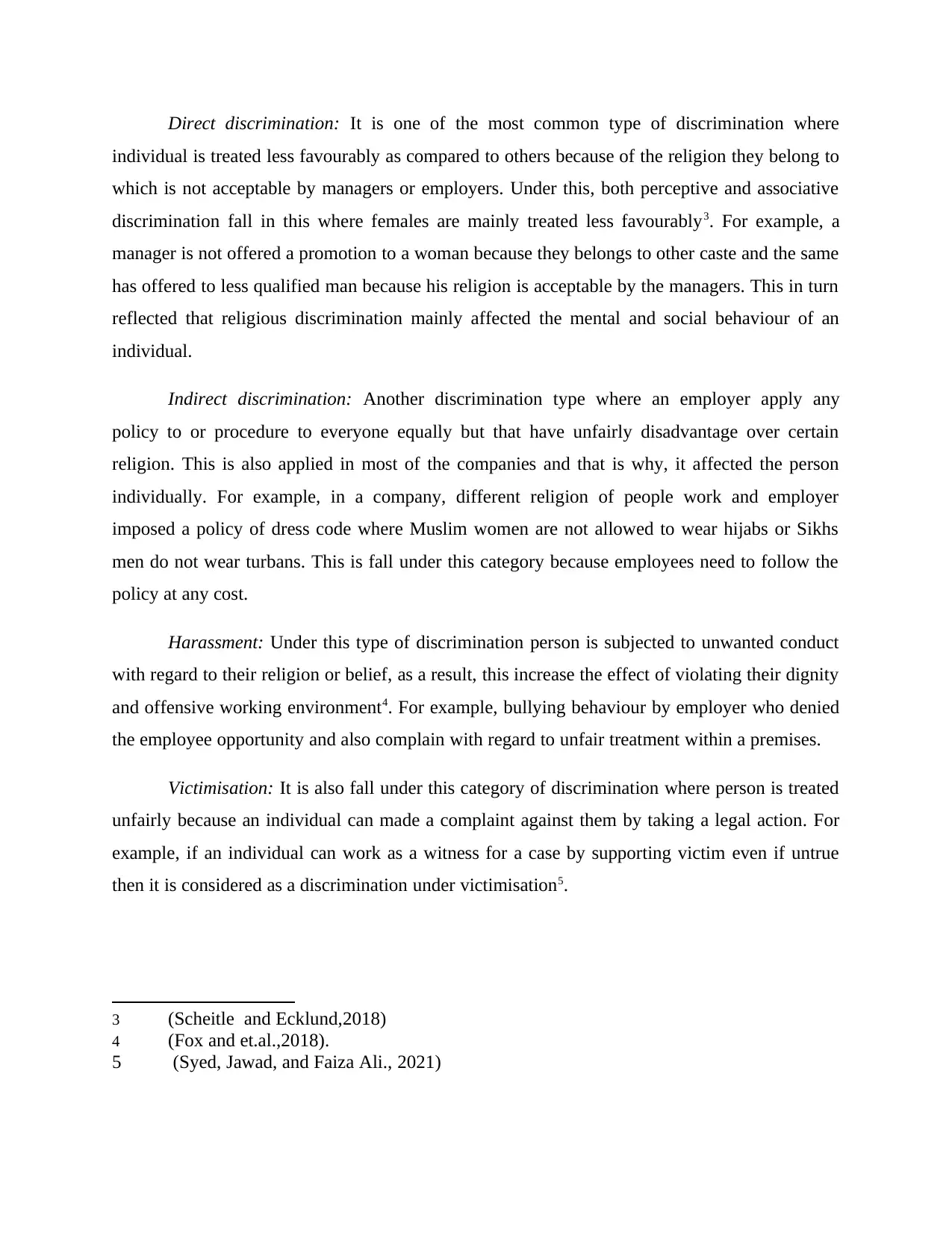
Direct discrimination: It is one of the most common type of discrimination where
individual is treated less favourably as compared to others because of the religion they belong to
which is not acceptable by managers or employers. Under this, both perceptive and associative
discrimination fall in this where females are mainly treated less favourably3. For example, a
manager is not offered a promotion to a woman because they belongs to other caste and the same
has offered to less qualified man because his religion is acceptable by the managers. This in turn
reflected that religious discrimination mainly affected the mental and social behaviour of an
individual.
Indirect discrimination: Another discrimination type where an employer apply any
policy to or procedure to everyone equally but that have unfairly disadvantage over certain
religion. This is also applied in most of the companies and that is why, it affected the person
individually. For example, in a company, different religion of people work and employer
imposed a policy of dress code where Muslim women are not allowed to wear hijabs or Sikhs
men do not wear turbans. This is fall under this category because employees need to follow the
policy at any cost.
Harassment: Under this type of discrimination person is subjected to unwanted conduct
with regard to their religion or belief, as a result, this increase the effect of violating their dignity
and offensive working environment4. For example, bullying behaviour by employer who denied
the employee opportunity and also complain with regard to unfair treatment within a premises.
Victimisation: It is also fall under this category of discrimination where person is treated
unfairly because an individual can made a complaint against them by taking a legal action. For
example, if an individual can work as a witness for a case by supporting victim even if untrue
then it is considered as a discrimination under victimisation5.
3 (Scheitle and Ecklund,2018)
4 (Fox and et.al.,2018).
5 (Syed, Jawad, and Faiza Ali., 2021)
individual is treated less favourably as compared to others because of the religion they belong to
which is not acceptable by managers or employers. Under this, both perceptive and associative
discrimination fall in this where females are mainly treated less favourably3. For example, a
manager is not offered a promotion to a woman because they belongs to other caste and the same
has offered to less qualified man because his religion is acceptable by the managers. This in turn
reflected that religious discrimination mainly affected the mental and social behaviour of an
individual.
Indirect discrimination: Another discrimination type where an employer apply any
policy to or procedure to everyone equally but that have unfairly disadvantage over certain
religion. This is also applied in most of the companies and that is why, it affected the person
individually. For example, in a company, different religion of people work and employer
imposed a policy of dress code where Muslim women are not allowed to wear hijabs or Sikhs
men do not wear turbans. This is fall under this category because employees need to follow the
policy at any cost.
Harassment: Under this type of discrimination person is subjected to unwanted conduct
with regard to their religion or belief, as a result, this increase the effect of violating their dignity
and offensive working environment4. For example, bullying behaviour by employer who denied
the employee opportunity and also complain with regard to unfair treatment within a premises.
Victimisation: It is also fall under this category of discrimination where person is treated
unfairly because an individual can made a complaint against them by taking a legal action. For
example, if an individual can work as a witness for a case by supporting victim even if untrue
then it is considered as a discrimination under victimisation5.
3 (Scheitle and Ecklund,2018)
4 (Fox and et.al.,2018).
5 (Syed, Jawad, and Faiza Ali., 2021)
Paraphrase This Document
Need a fresh take? Get an instant paraphrase of this document with our AI Paraphraser
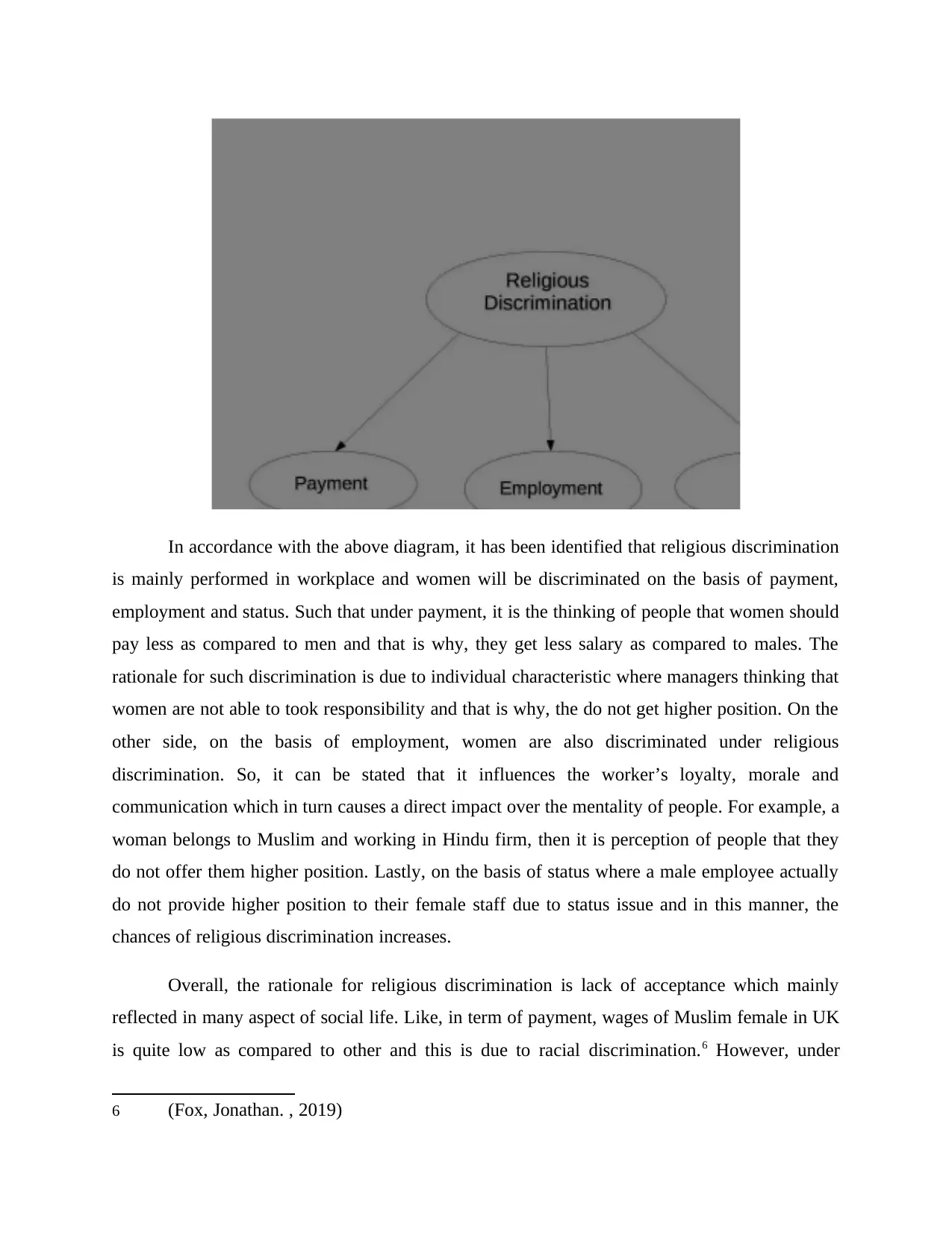
In accordance with the above diagram, it has been identified that religious discrimination
is mainly performed in workplace and women will be discriminated on the basis of payment,
employment and status. Such that under payment, it is the thinking of people that women should
pay less as compared to men and that is why, they get less salary as compared to males. The
rationale for such discrimination is due to individual characteristic where managers thinking that
women are not able to took responsibility and that is why, the do not get higher position. On the
other side, on the basis of employment, women are also discriminated under religious
discrimination. So, it can be stated that it influences the worker’s loyalty, morale and
communication which in turn causes a direct impact over the mentality of people. For example, a
woman belongs to Muslim and working in Hindu firm, then it is perception of people that they
do not offer them higher position. Lastly, on the basis of status where a male employee actually
do not provide higher position to their female staff due to status issue and in this manner, the
chances of religious discrimination increases.
Overall, the rationale for religious discrimination is lack of acceptance which mainly
reflected in many aspect of social life. Like, in term of payment, wages of Muslim female in UK
is quite low as compared to other and this is due to racial discrimination.6 However, under
6 (Fox, Jonathan. , 2019)
is mainly performed in workplace and women will be discriminated on the basis of payment,
employment and status. Such that under payment, it is the thinking of people that women should
pay less as compared to men and that is why, they get less salary as compared to males. The
rationale for such discrimination is due to individual characteristic where managers thinking that
women are not able to took responsibility and that is why, the do not get higher position. On the
other side, on the basis of employment, women are also discriminated under religious
discrimination. So, it can be stated that it influences the worker’s loyalty, morale and
communication which in turn causes a direct impact over the mentality of people. For example, a
woman belongs to Muslim and working in Hindu firm, then it is perception of people that they
do not offer them higher position. Lastly, on the basis of status where a male employee actually
do not provide higher position to their female staff due to status issue and in this manner, the
chances of religious discrimination increases.
Overall, the rationale for religious discrimination is lack of acceptance which mainly
reflected in many aspect of social life. Like, in term of payment, wages of Muslim female in UK
is quite low as compared to other and this is due to racial discrimination.6 However, under
6 (Fox, Jonathan. , 2019)
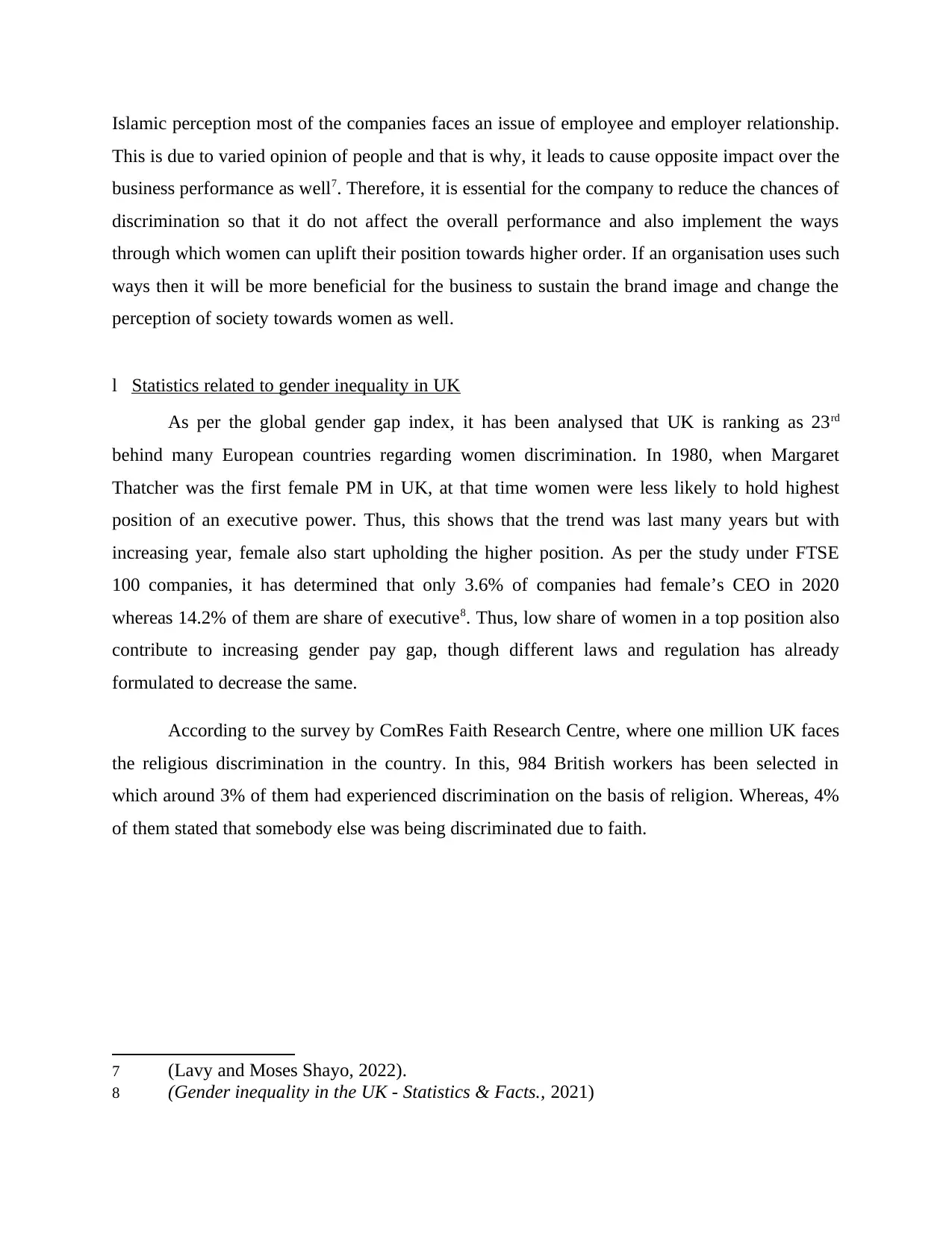
Islamic perception most of the companies faces an issue of employee and employer relationship.
This is due to varied opinion of people and that is why, it leads to cause opposite impact over the
business performance as well7. Therefore, it is essential for the company to reduce the chances of
discrimination so that it do not affect the overall performance and also implement the ways
through which women can uplift their position towards higher order. If an organisation uses such
ways then it will be more beneficial for the business to sustain the brand image and change the
perception of society towards women as well.
l弐Statistics related to gender inequality in UK
As per the global gender gap index, it has been analysed that UK is ranking as 23rd
behind many European countries regarding women discrimination. In 1980, when Margaret
Thatcher was the first female PM in UK, at that time women were less likely to hold highest
position of an executive power. Thus, this shows that the trend was last many years but with
increasing year, female also start upholding the higher position. As per the study under FTSE
100 companies, it has determined that only 3.6% of companies had female’s CEO in 2020
whereas 14.2% of them are share of executive8. Thus, low share of women in a top position also
contribute to increasing gender pay gap, though different laws and regulation has already
formulated to decrease the same.
According to the survey by ComRes Faith Research Centre, where one million UK faces
the religious discrimination in the country. In this, 984 British workers has been selected in
which around 3% of them had experienced discrimination on the basis of religion. Whereas, 4%
of them stated that somebody else was being discriminated due to faith.
7 (Lavy and Moses Shayo, 2022).
8 (Gender inequality in the UK - Statistics & Facts., 2021)
This is due to varied opinion of people and that is why, it leads to cause opposite impact over the
business performance as well7. Therefore, it is essential for the company to reduce the chances of
discrimination so that it do not affect the overall performance and also implement the ways
through which women can uplift their position towards higher order. If an organisation uses such
ways then it will be more beneficial for the business to sustain the brand image and change the
perception of society towards women as well.
l弐Statistics related to gender inequality in UK
As per the global gender gap index, it has been analysed that UK is ranking as 23rd
behind many European countries regarding women discrimination. In 1980, when Margaret
Thatcher was the first female PM in UK, at that time women were less likely to hold highest
position of an executive power. Thus, this shows that the trend was last many years but with
increasing year, female also start upholding the higher position. As per the study under FTSE
100 companies, it has determined that only 3.6% of companies had female’s CEO in 2020
whereas 14.2% of them are share of executive8. Thus, low share of women in a top position also
contribute to increasing gender pay gap, though different laws and regulation has already
formulated to decrease the same.
According to the survey by ComRes Faith Research Centre, where one million UK faces
the religious discrimination in the country. In this, 984 British workers has been selected in
which around 3% of them had experienced discrimination on the basis of religion. Whereas, 4%
of them stated that somebody else was being discriminated due to faith.
7 (Lavy and Moses Shayo, 2022).
8 (Gender inequality in the UK - Statistics & Facts., 2021)
⊘ This is a preview!⊘
Do you want full access?
Subscribe today to unlock all pages.

Trusted by 1+ million students worldwide
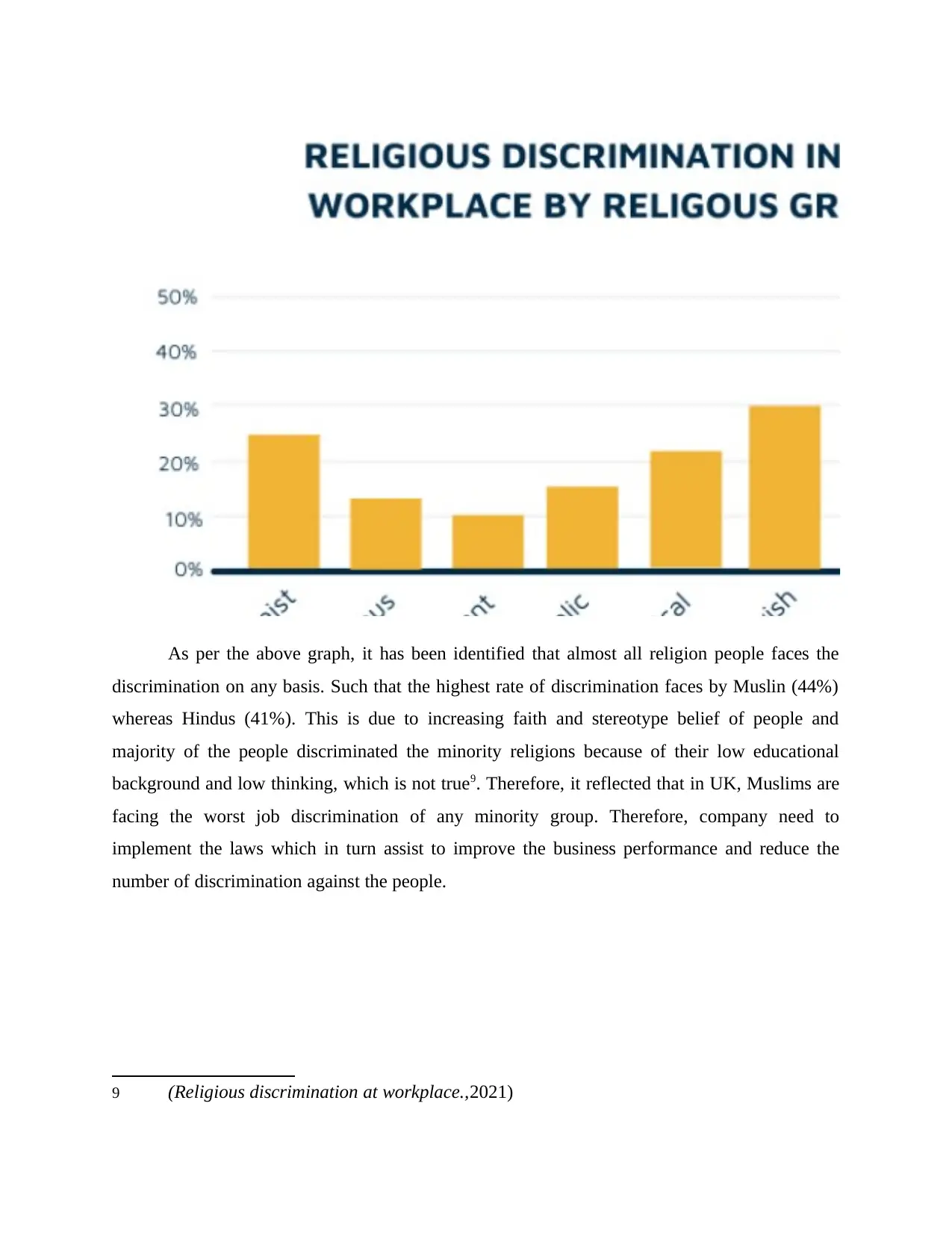
As per the above graph, it has been identified that almost all religion people faces the
discrimination on any basis. Such that the highest rate of discrimination faces by Muslin (44%)
whereas Hindus (41%). This is due to increasing faith and stereotype belief of people and
majority of the people discriminated the minority religions because of their low educational
background and low thinking, which is not true9. Therefore, it reflected that in UK, Muslims are
facing the worst job discrimination of any minority group. Therefore, company need to
implement the laws which in turn assist to improve the business performance and reduce the
number of discrimination against the people.
9 (Religious discrimination at workplace.,2021)
discrimination on any basis. Such that the highest rate of discrimination faces by Muslin (44%)
whereas Hindus (41%). This is due to increasing faith and stereotype belief of people and
majority of the people discriminated the minority religions because of their low educational
background and low thinking, which is not true9. Therefore, it reflected that in UK, Muslims are
facing the worst job discrimination of any minority group. Therefore, company need to
implement the laws which in turn assist to improve the business performance and reduce the
number of discrimination against the people.
9 (Religious discrimination at workplace.,2021)
Paraphrase This Document
Need a fresh take? Get an instant paraphrase of this document with our AI Paraphraser
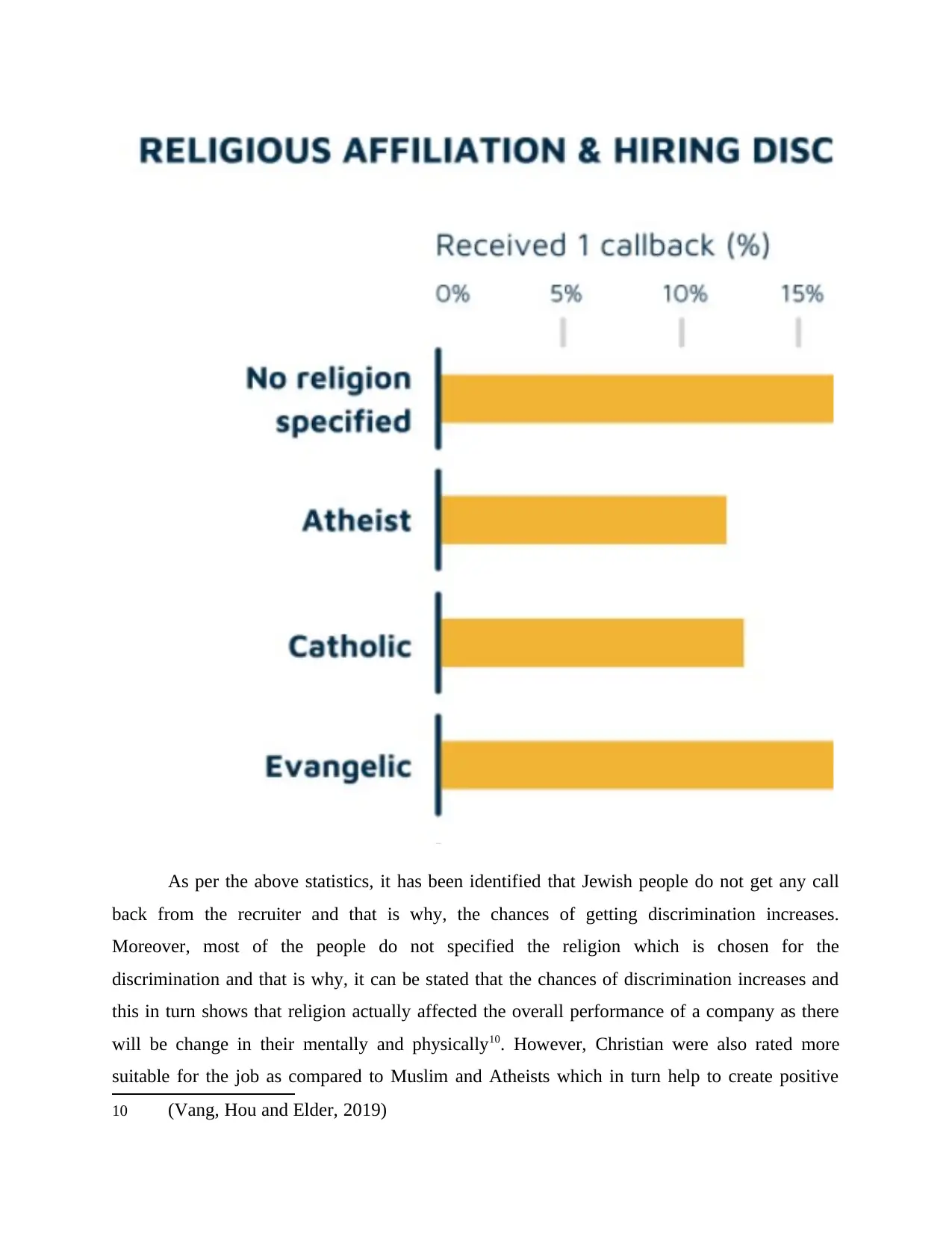
As per the above statistics, it has been identified that Jewish people do not get any call
back from the recruiter and that is why, the chances of getting discrimination increases.
Moreover, most of the people do not specified the religion which is chosen for the
discrimination and that is why, it can be stated that the chances of discrimination increases and
this in turn shows that religion actually affected the overall performance of a company as there
will be change in their mentally and physically10. However, Christian were also rated more
suitable for the job as compared to Muslim and Atheists which in turn help to create positive
10 (Vang, Hou and Elder, 2019)
back from the recruiter and that is why, the chances of getting discrimination increases.
Moreover, most of the people do not specified the religion which is chosen for the
discrimination and that is why, it can be stated that the chances of discrimination increases and
this in turn shows that religion actually affected the overall performance of a company as there
will be change in their mentally and physically10. However, Christian were also rated more
suitable for the job as compared to Muslim and Atheists which in turn help to create positive
10 (Vang, Hou and Elder, 2019)
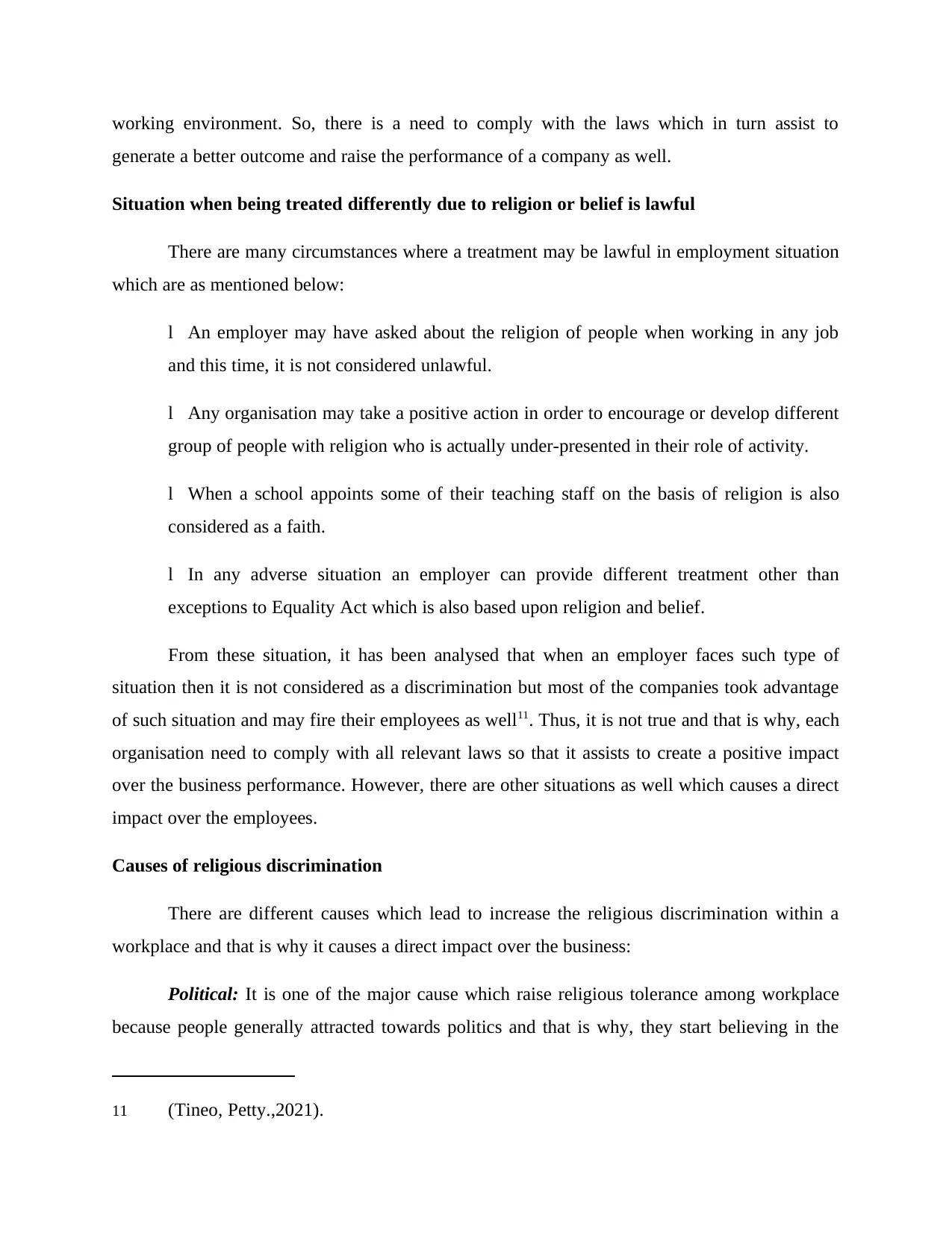
working environment. So, there is a need to comply with the laws which in turn assist to
generate a better outcome and raise the performance of a company as well.
Situation when being treated differently due to religion or belief is lawful
There are many circumstances where a treatment may be lawful in employment situation
which are as mentioned below:
l弐An employer may have asked about the religion of people when working in any job
and this time, it is not considered unlawful.
l弐Any organisation may take a positive action in order to encourage or develop different
group of people with religion who is actually under-presented in their role of activity.
l弐When a school appoints some of their teaching staff on the basis of religion is also
considered as a faith.
l弐In any adverse situation an employer can provide different treatment other than
exceptions to Equality Act which is also based upon religion and belief.
From these situation, it has been analysed that when an employer faces such type of
situation then it is not considered as a discrimination but most of the companies took advantage
of such situation and may fire their employees as well11. Thus, it is not true and that is why, each
organisation need to comply with all relevant laws so that it assists to create a positive impact
over the business performance. However, there are other situations as well which causes a direct
impact over the employees.
Causes of religious discrimination
There are different causes which lead to increase the religious discrimination within a
workplace and that is why it causes a direct impact over the business:
Political: It is one of the major cause which raise religious tolerance among workplace
because people generally attracted towards politics and that is why, they start believing in the
11 (Tineo, Petty.,2021).
generate a better outcome and raise the performance of a company as well.
Situation when being treated differently due to religion or belief is lawful
There are many circumstances where a treatment may be lawful in employment situation
which are as mentioned below:
l弐An employer may have asked about the religion of people when working in any job
and this time, it is not considered unlawful.
l弐Any organisation may take a positive action in order to encourage or develop different
group of people with religion who is actually under-presented in their role of activity.
l弐When a school appoints some of their teaching staff on the basis of religion is also
considered as a faith.
l弐In any adverse situation an employer can provide different treatment other than
exceptions to Equality Act which is also based upon religion and belief.
From these situation, it has been analysed that when an employer faces such type of
situation then it is not considered as a discrimination but most of the companies took advantage
of such situation and may fire their employees as well11. Thus, it is not true and that is why, each
organisation need to comply with all relevant laws so that it assists to create a positive impact
over the business performance. However, there are other situations as well which causes a direct
impact over the employees.
Causes of religious discrimination
There are different causes which lead to increase the religious discrimination within a
workplace and that is why it causes a direct impact over the business:
Political: It is one of the major cause which raise religious tolerance among workplace
because people generally attracted towards politics and that is why, they start believing in the
11 (Tineo, Petty.,2021).
⊘ This is a preview!⊘
Do you want full access?
Subscribe today to unlock all pages.

Trusted by 1+ million students worldwide
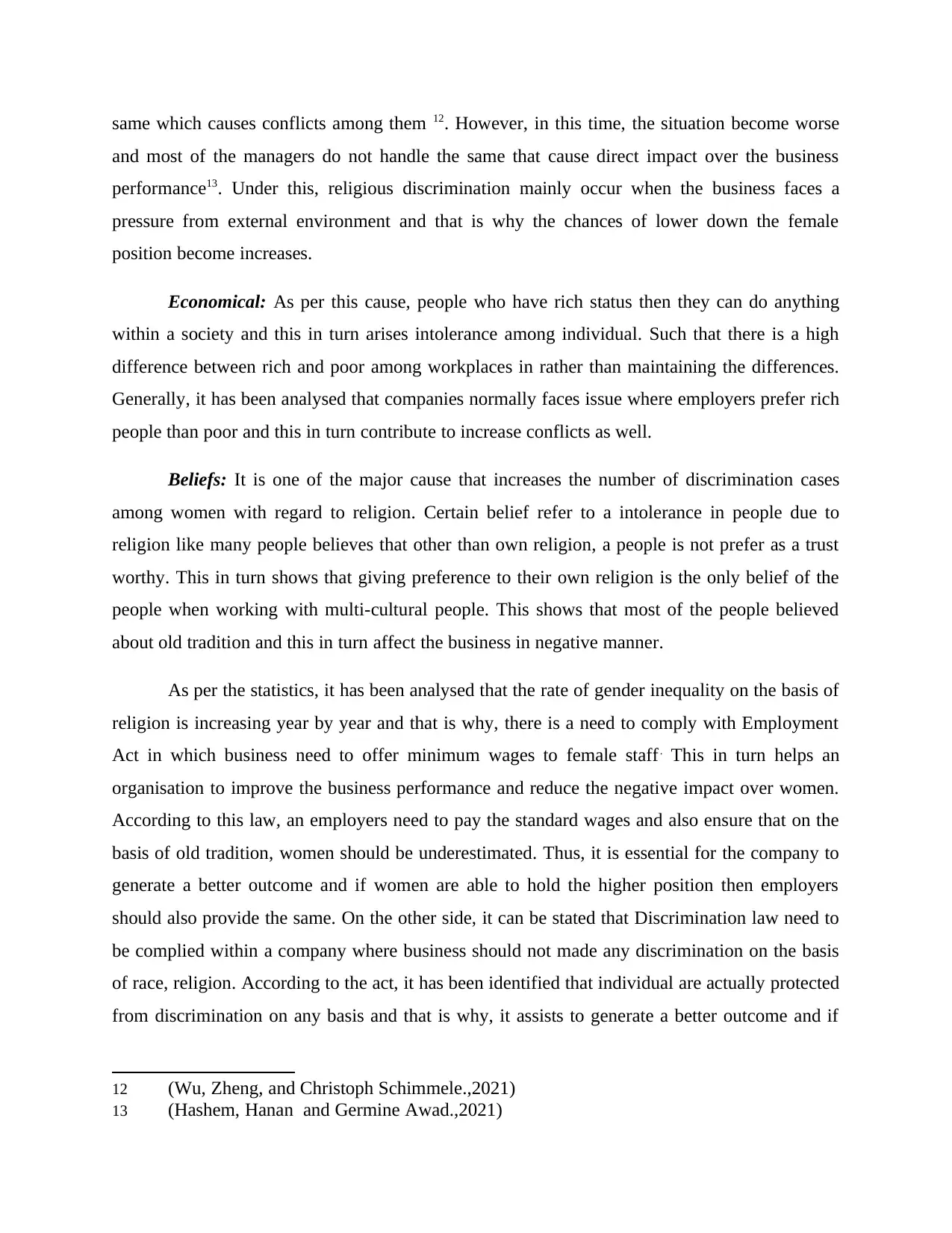
same which causes conflicts among them 12. However, in this time, the situation become worse
and most of the managers do not handle the same that cause direct impact over the business
performance13. Under this, religious discrimination mainly occur when the business faces a
pressure from external environment and that is why the chances of lower down the female
position become increases.
Economical: As per this cause, people who have rich status then they can do anything
within a society and this in turn arises intolerance among individual. Such that there is a high
difference between rich and poor among workplaces in rather than maintaining the differences.
Generally, it has been analysed that companies normally faces issue where employers prefer rich
people than poor and this in turn contribute to increase conflicts as well.
Beliefs: It is one of the major cause that increases the number of discrimination cases
among women with regard to religion. Certain belief refer to a intolerance in people due to
religion like many people believes that other than own religion, a people is not prefer as a trust
worthy. This in turn shows that giving preference to their own religion is the only belief of the
people when working with multi-cultural people. This shows that most of the people believed
about old tradition and this in turn affect the business in negative manner.
As per the statistics, it has been analysed that the rate of gender inequality on the basis of
religion is increasing year by year and that is why, there is a need to comply with Employment
Act in which business need to offer minimum wages to female staff. This in turn helps an
organisation to improve the business performance and reduce the negative impact over women.
According to this law, an employers need to pay the standard wages and also ensure that on the
basis of old tradition, women should be underestimated. Thus, it is essential for the company to
generate a better outcome and if women are able to hold the higher position then employers
should also provide the same. On the other side, it can be stated that Discrimination law need to
be complied within a company where business should not made any discrimination on the basis
of race, religion. According to the act, it has been identified that individual are actually protected
from discrimination on any basis and that is why, it assists to generate a better outcome and if
12 (Wu, Zheng, and Christoph Schimmele.,2021)
13 (Hashem, Hanan and Germine Awad.,2021)
and most of the managers do not handle the same that cause direct impact over the business
performance13. Under this, religious discrimination mainly occur when the business faces a
pressure from external environment and that is why the chances of lower down the female
position become increases.
Economical: As per this cause, people who have rich status then they can do anything
within a society and this in turn arises intolerance among individual. Such that there is a high
difference between rich and poor among workplaces in rather than maintaining the differences.
Generally, it has been analysed that companies normally faces issue where employers prefer rich
people than poor and this in turn contribute to increase conflicts as well.
Beliefs: It is one of the major cause that increases the number of discrimination cases
among women with regard to religion. Certain belief refer to a intolerance in people due to
religion like many people believes that other than own religion, a people is not prefer as a trust
worthy. This in turn shows that giving preference to their own religion is the only belief of the
people when working with multi-cultural people. This shows that most of the people believed
about old tradition and this in turn affect the business in negative manner.
As per the statistics, it has been analysed that the rate of gender inequality on the basis of
religion is increasing year by year and that is why, there is a need to comply with Employment
Act in which business need to offer minimum wages to female staff. This in turn helps an
organisation to improve the business performance and reduce the negative impact over women.
According to this law, an employers need to pay the standard wages and also ensure that on the
basis of old tradition, women should be underestimated. Thus, it is essential for the company to
generate a better outcome and if women are able to hold the higher position then employers
should also provide the same. On the other side, it can be stated that Discrimination law need to
be complied within a company where business should not made any discrimination on the basis
of race, religion. According to the act, it has been identified that individual are actually protected
from discrimination on any basis and that is why, it assists to generate a better outcome and if
12 (Wu, Zheng, and Christoph Schimmele.,2021)
13 (Hashem, Hanan and Germine Awad.,2021)
Paraphrase This Document
Need a fresh take? Get an instant paraphrase of this document with our AI Paraphraser
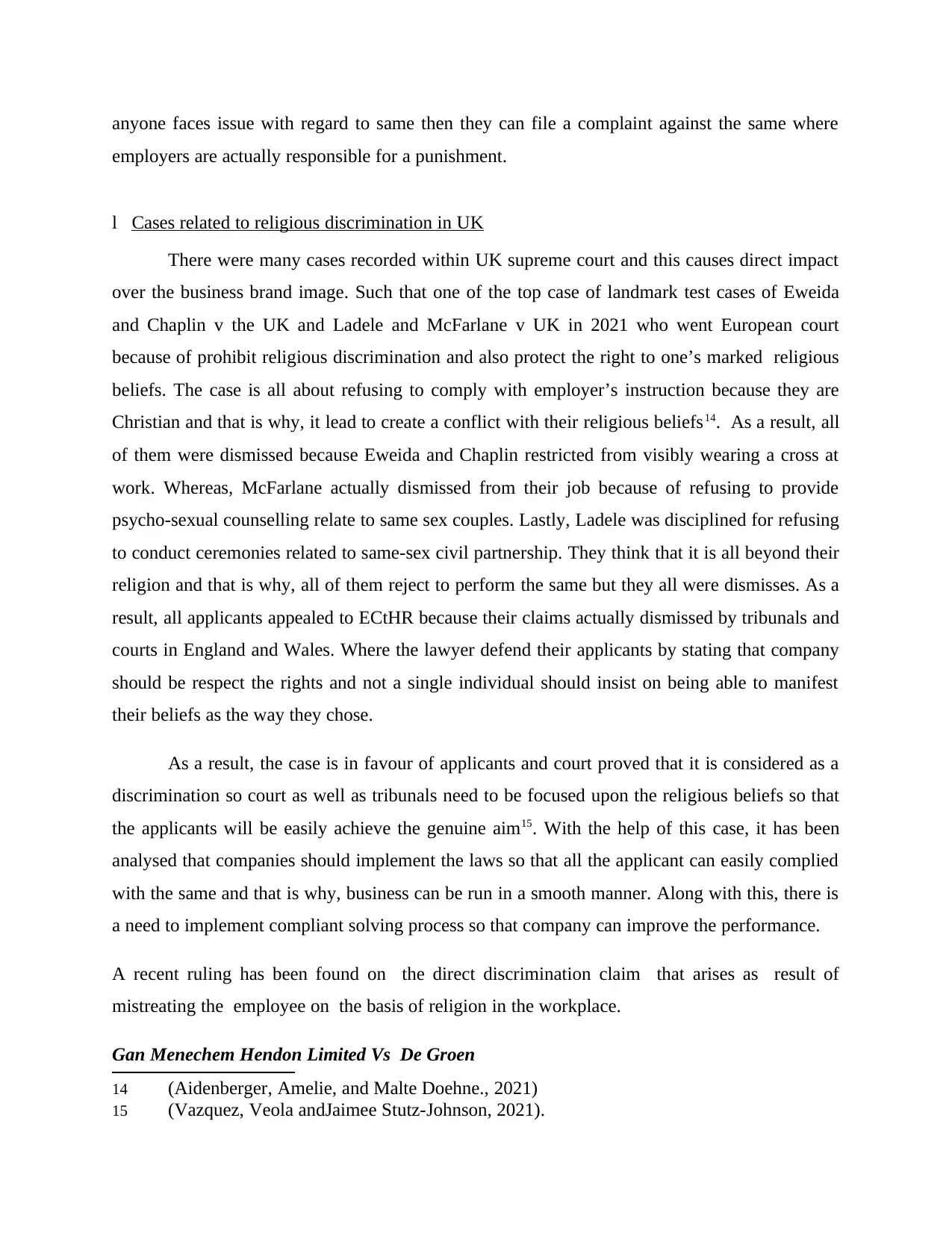
anyone faces issue with regard to same then they can file a complaint against the same where
employers are actually responsible for a punishment.
l弐Cases related to religious discrimination in UK
There were many cases recorded within UK supreme court and this causes direct impact
over the business brand image. Such that one of the top case of landmark test cases of Eweida
and Chaplin v the UK and Ladele and McFarlane v UK in 2021 who went European court
because of prohibit religious discrimination and also protect the right to one’s marked religious
beliefs. The case is all about refusing to comply with employer’s instruction because they are
Christian and that is why, it lead to create a conflict with their religious beliefs14. As a result, all
of them were dismissed because Eweida and Chaplin restricted from visibly wearing a cross at
work. Whereas, McFarlane actually dismissed from their job because of refusing to provide
psycho-sexual counselling relate to same sex couples. Lastly, Ladele was disciplined for refusing
to conduct ceremonies related to same-sex civil partnership. They think that it is all beyond their
religion and that is why, all of them reject to perform the same but they all were dismisses. As a
result, all applicants appealed to ECtHR because their claims actually dismissed by tribunals and
courts in England and Wales. Where the lawyer defend their applicants by stating that company
should be respect the rights and not a single individual should insist on being able to manifest
their beliefs as the way they chose.
As a result, the case is in favour of applicants and court proved that it is considered as a
discrimination so court as well as tribunals need to be focused upon the religious beliefs so that
the applicants will be easily achieve the genuine aim15. With the help of this case, it has been
analysed that companies should implement the laws so that all the applicant can easily complied
with the same and that is why, business can be run in a smooth manner. Along with this, there is
a need to implement compliant solving process so that company can improve the performance.
A recent ruling has been found on the direct discrimination claim that arises as result of
mistreating the employee on the basis of religion in the workplace.
Gan Menechem Hendon Limited Vs De Groen
14 (Aidenberger, Amelie, and Malte Doehne., 2021)
15 (Vazquez, Veola andJaimee Stutz-Johnson, 2021).
employers are actually responsible for a punishment.
l弐Cases related to religious discrimination in UK
There were many cases recorded within UK supreme court and this causes direct impact
over the business brand image. Such that one of the top case of landmark test cases of Eweida
and Chaplin v the UK and Ladele and McFarlane v UK in 2021 who went European court
because of prohibit religious discrimination and also protect the right to one’s marked religious
beliefs. The case is all about refusing to comply with employer’s instruction because they are
Christian and that is why, it lead to create a conflict with their religious beliefs14. As a result, all
of them were dismissed because Eweida and Chaplin restricted from visibly wearing a cross at
work. Whereas, McFarlane actually dismissed from their job because of refusing to provide
psycho-sexual counselling relate to same sex couples. Lastly, Ladele was disciplined for refusing
to conduct ceremonies related to same-sex civil partnership. They think that it is all beyond their
religion and that is why, all of them reject to perform the same but they all were dismisses. As a
result, all applicants appealed to ECtHR because their claims actually dismissed by tribunals and
courts in England and Wales. Where the lawyer defend their applicants by stating that company
should be respect the rights and not a single individual should insist on being able to manifest
their beliefs as the way they chose.
As a result, the case is in favour of applicants and court proved that it is considered as a
discrimination so court as well as tribunals need to be focused upon the religious beliefs so that
the applicants will be easily achieve the genuine aim15. With the help of this case, it has been
analysed that companies should implement the laws so that all the applicant can easily complied
with the same and that is why, business can be run in a smooth manner. Along with this, there is
a need to implement compliant solving process so that company can improve the performance.
A recent ruling has been found on the direct discrimination claim that arises as result of
mistreating the employee on the basis of religion in the workplace.
Gan Menechem Hendon Limited Vs De Groen
14 (Aidenberger, Amelie, and Malte Doehne., 2021)
15 (Vazquez, Veola andJaimee Stutz-Johnson, 2021).
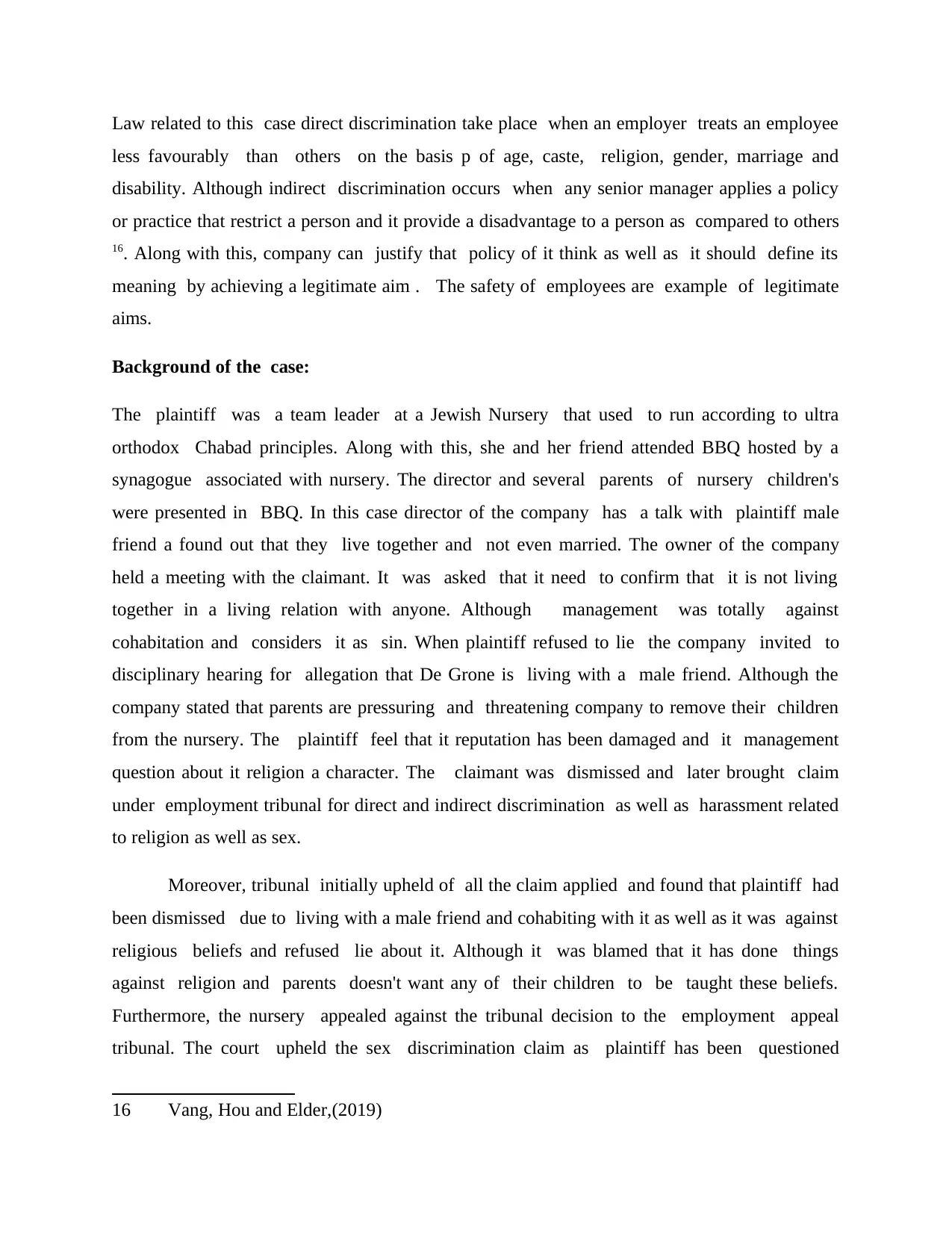
Law related to this case direct discrimination take place when an employer treats an employee
less favourably than others on the basis p of age, caste, religion, gender, marriage and
disability. Although indirect discrimination occurs when any senior manager applies a policy
or practice that restrict a person and it provide a disadvantage to a person as compared to others
16. Along with this, company can justify that policy of it think as well as it should define its
meaning by achieving a legitimate aim . The safety of employees are example of legitimate
aims.
Background of the case:
The plaintiff was a team leader at a Jewish Nursery that used to run according to ultra
orthodox Chabad principles. Along with this, she and her friend attended BBQ hosted by a
synagogue associated with nursery. The director and several parents of nursery children's
were presented in BBQ. In this case director of the company has a talk with plaintiff male
friend a found out that they live together and not even married. The owner of the company
held a meeting with the claimant. It was asked that it need to confirm that it is not living
together in a living relation with anyone. Although management was totally against
cohabitation and considers it as sin. When plaintiff refused to lie the company invited to
disciplinary hearing for allegation that De Grone is living with a male friend. Although the
company stated that parents are pressuring and threatening company to remove their children
from the nursery. The plaintiff feel that it reputation has been damaged and it management
question about it religion a character. The claimant was dismissed and later brought claim
under employment tribunal for direct and indirect discrimination as well as harassment related
to religion as well as sex.
Moreover, tribunal initially upheld of all the claim applied and found that plaintiff had
been dismissed due to living with a male friend and cohabiting with it as well as it was against
religious beliefs and refused lie about it. Although it was blamed that it has done things
against religion and parents doesn't want any of their children to be taught these beliefs.
Furthermore, the nursery appealed against the tribunal decision to the employment appeal
tribunal. The court upheld the sex discrimination claim as plaintiff has been questioned
16 Vang, Hou and Elder,(2019)
less favourably than others on the basis p of age, caste, religion, gender, marriage and
disability. Although indirect discrimination occurs when any senior manager applies a policy
or practice that restrict a person and it provide a disadvantage to a person as compared to others
16. Along with this, company can justify that policy of it think as well as it should define its
meaning by achieving a legitimate aim . The safety of employees are example of legitimate
aims.
Background of the case:
The plaintiff was a team leader at a Jewish Nursery that used to run according to ultra
orthodox Chabad principles. Along with this, she and her friend attended BBQ hosted by a
synagogue associated with nursery. The director and several parents of nursery children's
were presented in BBQ. In this case director of the company has a talk with plaintiff male
friend a found out that they live together and not even married. The owner of the company
held a meeting with the claimant. It was asked that it need to confirm that it is not living
together in a living relation with anyone. Although management was totally against
cohabitation and considers it as sin. When plaintiff refused to lie the company invited to
disciplinary hearing for allegation that De Grone is living with a male friend. Although the
company stated that parents are pressuring and threatening company to remove their children
from the nursery. The plaintiff feel that it reputation has been damaged and it management
question about it religion a character. The claimant was dismissed and later brought claim
under employment tribunal for direct and indirect discrimination as well as harassment related
to religion as well as sex.
Moreover, tribunal initially upheld of all the claim applied and found that plaintiff had
been dismissed due to living with a male friend and cohabiting with it as well as it was against
religious beliefs and refused lie about it. Although it was blamed that it has done things
against religion and parents doesn't want any of their children to be taught these beliefs.
Furthermore, the nursery appealed against the tribunal decision to the employment appeal
tribunal. The court upheld the sex discrimination claim as plaintiff has been questioned
16 Vang, Hou and Elder,(2019)
⊘ This is a preview!⊘
Do you want full access?
Subscribe today to unlock all pages.

Trusted by 1+ million students worldwide
1 out of 20
Related Documents
Your All-in-One AI-Powered Toolkit for Academic Success.
+13062052269
info@desklib.com
Available 24*7 on WhatsApp / Email
![[object Object]](/_next/static/media/star-bottom.7253800d.svg)
Unlock your academic potential
Copyright © 2020–2026 A2Z Services. All Rights Reserved. Developed and managed by ZUCOL.





